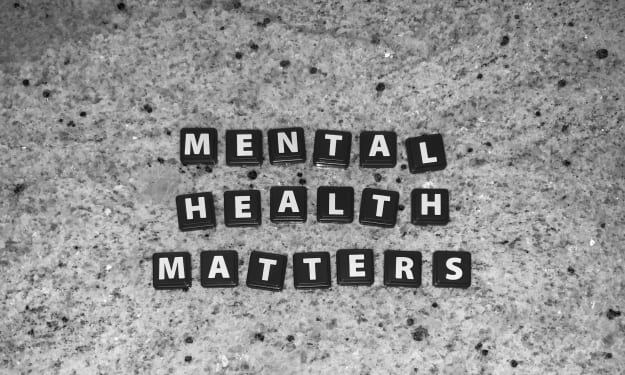Notes I've Taken During Therapy
They've helped me improve myself on the daily and will help you, too.

I attend virtual therapy twice a week. I am proud to say it and highly suggest a psychiatric intervention to everyone I know. Some are embarrassed to share this or even attempt to see a therapist because they feel it shows signs of weakness and makes them appear "crazy." That simply isn't true. Do you know how I know? During college, I stopped attending therapy due to logistics and I suffered greatly in ways that couldn't be seen by outsiders.
I stopped focusing on my self-improvement and personal development. I wasn't necessarily in a bad place, but I decided I'd rather stay comfortable in keeping with old habits that brought me trouble throughout the years. This meant getting enraged by small inconveniences and taking literally everything personally. I would give dirty looks to strangers if they upset me and couldn't bear to keep my mouth shut if someone offended me.
I was unhappy inside, even though I felt fulfilled in my college experience with my friends and various love interests. I chose to get offended and I chose to stay comfortable through the expression of anger in some form or another as my primary emotion. It was easier that way.
I noticed that my anger transitioned to rage, and I was easily set off by small disturbances. I even developed IBS. In my junior year of college, I agreed to up my antidepressant dosage from 5mg to 10mg without consulting a mental health worker professional. (Yes I know that's a minute amount.)
I attribute the significant increase in palpitations and panic attacks to my small frame's physiological reaction to my meds. It took a few months to subside. I hated the world and mankind as a whole, though I found genuine weekly reprieve in my yoga and meditation community of "Sacred Sistars."
My 'Sistars'I finally resumed therapy now that I have graduated and have been living at home, minutes away from the in-patient facility I visit weekly.
Over the past four months, my therapist has not only helped me control the way I manage and cope with my anger but has also given me tools that mitigate my feelings of anger from being so explosive. I almost don't recognize the person I was a few months back. And it just goes to show that with a little hard work and elbow grease, you can make anything happen.
I'm a note-taker. I always have been. I like to save ideas verbatim from the person who speaks them because I feel that usage of language is very important. If I should paraphrase in my notes, perhaps I would lose some intended value.
The usage of specific words and order and tone of words matter, which is why I record my notes word for word. This way I can save them for later to revisit. And if I should lack access to an emotionally intelligent individual that can pick me up when I have fallen down,
I know I can trust myself. Not only by bringing forth old nuggets of knowledge I've bookmarked from the past but also to aid in resurfacing tactics proven to work. I also add in my personal commentary post-session as a way to expedite the absorption of topics discussed. I'll include my added notes, too.
On Managing Anger and Responding Instead of Reacting
I can choose to turn off my reactions. I make choices, and even if something feels uncontrollable, I can always choose how I will act.
Expressing anger doesn't make you immature.
Your anger will never completely go away. It is an essential emotion.
Impulsive anger has put a veil over my resourcefulness.
Even mid-argument, find control over your emotions. Practice this and strengthen it over time.
Think about how I can react differently.
Change the environment or simply state "I'd rather talk about this later."
Take time to process what the argument was about and if it was serious or small.
Recognize what feeling you're actually feeling. Remember that your true feelings may be masked by anger since this is a recurring pattern for you.
Think, "How can I approach this in the best way possible for myself?"
Accept the recovery process and slip-ups. It's only natural. Be aware of any possible regressions, especially when you start to make significant progress and become comfortable again.
Remember, "to some extent, I am always in control."
It's all about overall harm reduction, not a single event.
Record all arguments in a notebook if possible.
On Relationships with Others who Suffer from Mental Health Issues
Know that you can never change others. It is a consistent struggle for ___.
I don't experience it so I don't understand it. That's okay.
Don't express aggressive emotions.
Help _____to have healthier lifestyle habits.
On Developing Healthy Habits
Learned behaviors don't make me who I am. I challenge myself to get uncomfortable and explore change.
Change never comes from your comfort zone.
How I want to live is a process that cannot be altered overnight.
Use the skills you know you have that work.
There are countless notes I have recorded mid-session, but these are the topics my therapist and I are currently working on. We agree that it's important to target each habit, emotion, or behavior one at a time as a way to ensure lasting change.
My therapist tells me that once we get to the "end-stage" of our healing, we remain in this stage forever. And when we start to get comfortable in our behaviors again, we must take careful note not to venture back into the old toxic, behaviors we fought so hard to get ourselves out of. The end-stage is forever when we are in recovery.
Recovery
She says that people struggling with all types of different things can enter what's called recovery. Though, this term is usually reserved for people trying to get clean from substances.
Truthfully, we are all in recovery. For me, I am recovering from the life-long usage of unreasonable anger and a poor system of managing my emotions, among other things.
And with a little help from my therapist twice a week, I have come to see life through a different lens, little by little. Whether an entire session is spent tackling one particular incident or covering lots of small seemingly trivial scenarios, I always find her tactics to be helpful.
No, therapists are not magicians. They offer you the tools you need to tackle your life's biggest struggles. But without your dedicated effort and hard work, there will be no change, nor improvement.
If you have been considering therapy but feel fearful of what people will think of you or see you as, stop and go immerse yourself in the beauty of a positive state of mind and thriving mental health.
I am so excited for you to get the help you need in any areas of your life that you may be struggling with. Trust me, you will not regret it.
Xo, Susie
〰〰〰〰〰〰〰〰〰〰〰〰〰〰〰〰〰〰〰〰〰〰〰〰〰〰〰〰〰〰〰〰〰
If you enjoyed this piece, please consider leaving a tip. Thanks!✌️😊
About the Creator
Susie Pinon
Italian chick with a New Yorker attitude. Free-spirited, eclectic by nature, vegan. I'm fueled by my passion for the art of words. I'm addicted to chocolate + love to heal through the sun's rays. Let's talk words
https://linktr.ee/xosusiep






Comments
There are no comments for this story
Be the first to respond and start the conversation.